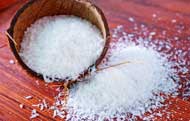
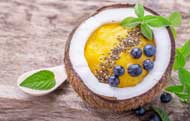
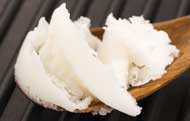

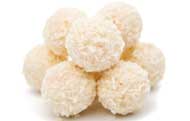

1. Coconut Facts
2. Types of Coconut
3. Nutritional Value of Coconut
4. Health Benefits of Coconut
The coconut tree (Cocos nucifera) is a member of the palm tree family (Arecaceae) and the only living species of the genus Cocos. The term "coconut" (or the archaic "cocoanut") can refer to the whole coconut palm, the seed, or the fruit, which botanically is a drupe, not a nut. Originally native to Central Indo-Pacific, they are now ubiquitous in coastal tropical regions and are a cultural icon of the tropics.
The inner flesh of the mature seed, as well as the coconut milk extracted from it, forms a regular part of the diets of many people in the tropics and subtropics. Coconuts are distinct from other fruits because their endosperm contains a large quantity of an almost clear liquid, called "coconut water" or "coconut juice". Mature, ripe coconuts can be used as edible seeds or processed for oil and plant milk from the flesh. Dried coconut flesh is called copra, and the oil and milk derived from it are commonly used in cooking – frying in particular – as well as in soaps and cosmetics. Sweet coconut sap can be made into drinks or fermented into palm wine or coconut vinegar.
History and Origin
The origin of the coconut is debated, but evidence points to two main centres of cultivation: the Indian Ocean and Southeast Asia/Pacific. Coconuts likely originated in the Indo-Pacific region and spread both naturally via ocean currents and intentionally by seafarers like the Austronesian peoples, who cultivated and dispersed them as far as Africa, the Pacific islands, and the Americas.
- • Malayan Dwarf
- • Tall Coconut
- • Samoan Orange Dwarf
- • Nias Yellow Dwarf
- • Hybrids
In Australia, a variety of coconut types are grown and sold, with common types including the Malayan dwarf (green and golden), and the larger, classic tall coconut. While "green" and "brown" are often used to describe ripeness, not varieties, dwarf varieties with distinct fruit colours like orange (Samoan Orange Dwarf) or bronze are also available.
Common types
Malayan Dwarf: This is a very popular type in Australia, with both "green" and "golden" (or bronze) varieties available, notes COCOTAP. They are smaller, compact palms, making them suitable for smaller landscapes.
Tall Coconut: These are the classic, large coconut palms that can grow up to 25 meters tall. Their fruits are often brown when fully mature.
Other varieties
Samoan Orange Dwarf: A dwarf variety with orange-hued fruit.
Nias Yellow Dwarf: Another dwarf variety with yellow-tinted fruit.
Hybrids: There are also hybrid varieties available, such as commercial green dwarf hybrids and introgressed dwarf x tall hybrids.
Important distinction: Ripeness vs. Variety
It is important to note that the terms "green," "orange," or "brown" can refer to both a coconut's variety and its ripeness.
Ripeness: Green coconuts are young and unripe with more water, while brown coconuts are fully mature and have more meat.
Variety: Some varieties are named for their colour, like the Samoan Orange Dwarf, while others are called Malayan Golden Dwarf.
Fruit ” Coconut ” ( Nutritional value )
Nutritional value per 100 g
Nuts, coconut meat, raw
|
Nutrient ( Proximate’s )
|
Unit
|
Value
|
Daily Value %
|
|
Energy
|
kcal
|
354
|
17.7%
|
|
Protein
|
g
|
3.33
|
6.6%
|
|
Total lipid (fat)
|
g
|
33.49
|
42.9%
|
|
Carbohydrate, by difference
|
g
|
15.23
|
5.5%
|
|
Fiber, total dietary
|
g
|
9.0
|
32.1%
|
|
Sugars, total
|
g
|
6.23
|
|
|
Minerals
|
|||
|
Calcium, Ca
|
mg
|
14
|
1.0%
|
|
Iron, Fe
|
mg
|
2.43
|
13.5%
|
|
Magnesium, Mg
|
mg
|
32
|
7.6%
|
|
Phosphorus, P
|
mg
|
113
|
9.0%
|
|
Potassium, K
|
mg
|
356
|
7.5%
|
|
Sodium, Na
|
mg
|
20
|
0.8%
|
|
Zinc, Zn
|
mg
|
1.10
|
10%
|
|
Copper, Cu
|
mg
|
0.435
|
48.3%
|
|
Manganese, Mn
|
mg
|
1.500
|
65.2%
|
|
Selenium, Se
|
mcg
|
10.1
|
18.3%
|
|
Vitamins
|
|||
|
Vitamin C, total ascorbic acid
|
mg
|
3.3
|
3.6%
|
|
Thiamin (B-1)
|
mg
|
0.066
|
5.5%
|
|
Riboflavin (B-2)
|
mg
|
0.020
|
1.5%
|
|
Niacin (B-3)
|
mg
|
0.540
|
3.3%
|
|
Pantothenic acid (B-5)
|
mg
|
0.300
|
6%
|
|
Vitamin B-6
|
mg
|
0.054
|
3.1%
|
|
Vitamin B-12
|
mg
|
0.00
|
|
|
Folate DFE (dietary folate) (B-9)
|
mcg
|
26
|
6.5%
|
|
Vitamin A, RAE (retinol)
|
mcg
|
0
|
0
|
|
Vitamin E (alpha-tocopherol)
|
mg
|
0.24
|
1.6%
|
|
Vitamin D (D2 + D3)
|
mcg
|
0
|
0
|
|
Vitamin K (phylloquinone)
|
mcg
|
0.2
|
0.1%
|
|
Lipids
|
|||
|
Saturated Fatty Acids
|
g
|
29.698
|
148.4%
|
|
Monounsaturated Fatty Acids
|
g
|
1.425
|
|
|
Polyunsaturated Fatty Acids
|
g
|
0.366
|
|
|
Trans Fatty Acids
|
g
|
||
|
Carotenoids
|
|||
|
Beta-Carotene
|
mcg
|
0
|
|
|
Lutein + zeaxanthin
|
mcg
|
0
|
|
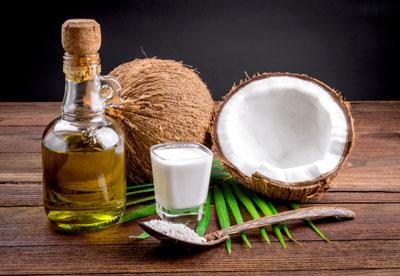
|
Reference Values are based on a 2,000 Calorie Intake, for Adults and Children 4 or More Years of Age. Your daily values may be higher or lower depending on your calorie needs.
|
|
Percentages are roughly approximated using (RDA) Recommended Dietary Allowances for adults. Source: USDA United States Department of Agriculture
|
|
Reference Values for Nutrition – FDA U.S. Food and Drug Administration
|
Coconut Nutritional Value
Coconuts offer health benefits such as providing energy, improving digestion, and having antimicrobial properties. They contain medium-chain triglycerides (MCTs), which the body uses for quick energy, and are a good source of fiber, which aids in digestion and promotes regular bowel movements. The fats and antioxidants in coconut can also help with weight management, antioxidant defence, and hydration. They also contain antioxidants that protect cells from damage and have antimicrobial properties due to compounds like lauric acid. While generally beneficial, coconut is high in calories and saturated fat, so moderation is key.
- HYDRATION (ELECTROLYTES)
Coconut water hydrates by providing electrolytes like potassium, sodium, and magnesium, which are lost through sweat. While it can be a good alternative to water for general hydration, especially after exercise, it's not necessarily superior to water and contains less sugar. - MEDIUM-CHAIN TRIGLYCERIDES (MCTS)
Coconut and medium-chain triglycerides (MCTs) are closely linked, as MCTs are a type of fat naturally found in high concentrations in coconut oil. While coconut oil is a source of MCTs, MCT oil is a refined supplement that contains a more concentrated and pure form of these fats. This is why MCT oil is digested and metabolized faster, providing an immediate energy source, while coconut oil can be used for both cooking and has MCTs as a - ANTIOXIDANT PROPERTIES
Coconut possesses antioxidant properties due to phenolic compounds found in its meat, water, and oil, which help neutralize free radicals, reduce oxidative stress, and may have anti-inflammatory and skin health benefits. Various parts of the coconut, such as coconut oil, water, and the whole fruit, contain these antioxidants, including gallic acid, caffeic acid, and ferulic acid, which can protect cells from damage and support overall health. - GOOD SOURCE OF FIBER
Coconut is good for fiber, particularly the raw meat and flour, which support digestive and overall gut health. Fiber in coconut can help with satiety, regulate blood sugar, and lower "bad" LDL cholesterol. A cup of raw coconut meat provides approximately 7 grams of fiber, and even 2 tablespoons of coconut flour have 5 grams.

- PROVIDES ENERGY
Coconut has been shown to provide energy because its meat and oil contain medium-chain triglycerides (MCTs), a type of fat that the body metabolizes quickly and uses for immediate fuel. Unlike other fats, MCTs are absorbed and converted into energy more rapidly, similar to how the body uses carbohydrates. Coconut water also provides energy by replacing electrolytes lost through physical activity. - VITAMINS AND MINERALS
Coconut is an excellent source of minerals like manganese, copper, iron, and selenium, contains potassium, magnesium, and zinc. It is not a major source of vitamins, but it does provide small amounts of B vitamins (including B1, B2, B3, B5, and B6), and vitamin C. - WEIGHT MANAGEMENT
Coconut can be part of a weight management plan due to its medium-chain triglycerides (MCTs), which may increase satiety and metabolism, and coconut water's low-calorie, hydrating properties. However, coconut products are calorie-dense and high in saturated fat, so moderation is crucial. Integrating small amounts of coconut into a balanced diet with regular exercise can support weight management goals. - ANTIMICROBIAL EFFECTS
Coconut has antimicrobial effects primarily due to its high content of lauric acid, which can disrupt bacterial membranes and inhibit bacterial growth. This is supported by in vitro studies showing that coconut oil and its derivatives have been effective against various bacteria and fungi, including Staphylococcus aureus, Streptococcus, and Candida albicans. Coconut water and other extracts have also demonstrated some antibacterial properties.
References
Nutrient Database – USDA (United States Department of Agriculture)
Reference Values for Nutrition – FDA U.S. Food and Drug Administration
Vitamins and minerals - Coconut is an excellent source of minerals like manganese, copper, iron, and selenium, contains potassium, magnesium, and zinc. It is not a major source of vitamins, but it does provide small amounts of B vitamins (including B1, B2, B3, B5, and B6), and vitamin C.
Medium-chain triglycerides (MCTs) - Coconut and medium-chain triglycerides (MCTs) are closely linked, as MCTs are a type of fat naturally found in high concentrations in coconut oil. While coconut oil is a source of MCTs, MCT oil is a refined supplement that contains a more concentrated and pure form of these fats. This is why MCT oil is digested and metabolized faster, providing an immediate energy source, while coconut oil can be used for both cooking and has MCTs as a component.
Antioxidant properties - Coconut possesses antioxidant properties due to phenolic compounds found in its meat, water, and oil, which help neutralize free radicals, reduce oxidative stress, and may have anti-inflammatory and skin health benefits. Various parts of the coconut, such as coconut oil, water, and the whole fruit, contain these antioxidants, including gallic acid, caffeic acid, and ferulic acid, which can protect cells from damage and support overall health.
Antimicrobial effects - Coconut has antimicrobial effects primarily due to its high content of lauric acid, which can disrupt bacterial membranes and inhibit bacterial growth. This is supported by in vitro studies showing that coconut oil and its derivatives have been effective against various bacteria and fungi, including Staphylococcus aureus, Streptococcus, and Candida albicans. Coconut water and other extracts have also demonstrated some antibacterial properties.
Provides energy – Coconut provides energy because its meat and oil contain medium-chain triglycerides (MCTs), a type of fat that the body metabolizes quickly and uses for immediate fuel. Unlike other fats, MCTs are absorbed and converted into energy more rapidly, similar to how the body uses carbohydrates. Coconut water also provides energy by replacing electrolytes lost through physical activity.
Weight management - Coconut can be part of a weight management plan due to its medium-chain triglycerides (MCTs), which may increase satiety and metabolism, and coconut water's low-calorie, hydrating properties. However, coconut products are calorie-dense and high in saturated fat, so moderation is crucial. Integrating small amounts of coconut into a balanced diet with regular exercise can support weight management goals.
Hydration (Electrolytes) - Coconut water hydrates by providing electrolytes like potassium, sodium, and magnesium, which are lost through sweat. While it can be a good alternative to water for general hydration, especially after exercise, it's not necessarily superior to water and contains less sugar than many sports drinks.
Good source of fiber - Coconut is good for fiber, particularly the raw meat and flour, which support digestive and overall gut health. Fiber in coconut can help with satiety, regulate blood sugar, and lower "bad" LDL cholesterol. A cup of raw coconut meat provides approximately 7 grams of fiber, and even 2 tablespoons of coconut flour have 5 grams.
Important considerations (Moderation is key) Due to their high calorie and saturated fat content, coconuts and coconut products should be consumed in moderation as part of a balanced diet.
